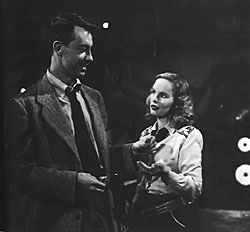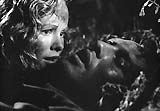Gun Crazy (1949)
Alternate Title: Deadly Is the Female
Director: Joseph H. Lewis
What goes together like guns and ammunition? For fans of classic noir, the only answer is Annie Laurie Starr and Bart Tare, the sharpshooting outlaw couple in Gun Crazy. Joseph H. Lewis’s mesmerizing film noir is just about as pulpy as they come, with its unironic dialogue and seedy environments. “I’m bad,” says Laurie to Bart, “But I’ll try awfully hard to be good. Awfully hard.” “It makes me feel good inside, like I’m somebody,” says Bart about his gunslinging talents. These are two elemental characters who act mainly on emotion. Even the complicated heist they laboriously plan, which requires Laurie to get a job in the Armour-Albuquerque payroll department, looks like something they executed on the fly that afternoon. Indeed, they throw caution to the wind entirely after the robbery and take off for the California border together instead of driving in separate cars to opposite corners of the United States as they had agreed. Why? They aren’t just crazy about guns. They simply cannot be apart from each other.
It doesn’t look as though Bart is headed for a life as a fugitive from justice at the start of the movie. A 13-year-old Bart (played by “Rusty” [Russ] Tamblyn) is in juvenile court for smashing a store window and stealing a gun, but his sister and closest friends say he isn’t a dange r to anyone. An incident in which he killed a newly hatched chick with a b.b. gun has made it impossible for him to kill anything. The judge, though sympathetic, still sends Bart to reform school until he turns 18 to discourage him from stealing. Four years in the Army follow, and Bart (John Dall) returns to his hometown to look for work with the Remington company. Reunited with the boyhood friends who stood up for him in court, he attends a carnival with them where he meets Laurie (Peggy Cummins), a sideshow sharpshooter. Although Bart has a sweet, Jimmy Stewartesque demeanor and Laurie couldn’t look any more tough and deadly, the attraction is immediate. He gets a job as her partner and eventually they leave the show, marry, and seem to be headed for happily ever after.
r to anyone. An incident in which he killed a newly hatched chick with a b.b. gun has made it impossible for him to kill anything. The judge, though sympathetic, still sends Bart to reform school until he turns 18 to discourage him from stealing. Four years in the Army follow, and Bart (John Dall) returns to his hometown to look for work with the Remington company. Reunited with the boyhood friends who stood up for him in court, he attends a carnival with them where he meets Laurie (Peggy Cummins), a sideshow sharpshooter. Although Bart has a sweet, Jimmy Stewartesque demeanor and Laurie couldn’t look any more tough and deadly, the attraction is immediate. He gets a job as her partner and eventually they leave the show, marry, and seem to be headed for happily ever after.
Scenes of the high life Bart and Laurie are living give way, however, to a boxcar diner where the pair must refuse onions on their hamburgers because it costs 5 cents extra. As they wolf down their food, Laurie is probably already hatching her “I’ll never be hungry again” plan. “I want things. Lots of things,” she says and ropes a helplessly in love Bart into a life as her stick-up partner. Never seeming to able to hold onto money, Bart and Laurie’s jobs get bigger and bolder, moving from liquor stores to banks. The payroll heist is to be their last big job. “Just one more,” Laurie promises a reluctant Bart. It’s not hard for the avid noir fan to figure out why.
This is one of the more ingenious noirs I’ve seen. At the start of their final robbery, Bart moves through a sea of animal carcasses as he makes his way from the Armour loading dock to the payroll office, clearly foreshadowing his own death in a new, more contemporary way. Gun Crazy takes the noir screen vocabulary—confining interiors, moody lighting, tight window frames, odd camera angles—and twists them slightly. In its obligatory broken mirror, for example, neither Bart nor Laurie are reflected, but rather, a rival of Bart’s for Laurie’s loyalty. In a sense, this break from convention signals that this noir has something few other films of its kind can offer—bad guys who earn our sympathy, in this case, by being completely in love. The movie was an obvious influence on Bonnie and Clyde, and both films are as much love stories as crime dramas.
Love, of course, never conquers all in noir, and Bart and Laurie meet their end in a terrific scene in a foggy swamp that represents a place of innocence from Bart’s youth and the final, confining setting for a doomed love. The film earns the complex emotions we feel at the end by giving us so much to chew on along the way. l
their end in a terrific scene in a foggy swamp that represents a place of innocence from Bart’s youth and the final, confining setting for a doomed love. The film earns the complex emotions we feel at the end by giving us so much to chew on along the way. l
Alternate Title: Deadly Is the Female
Director: Joseph H. Lewis
What goes together like guns and ammunition? For fans of classic noir, the only answer is Annie Laurie Starr and Bart Tare, the sharpshooting outlaw couple in Gun Crazy. Joseph H. Lewis’s mesmerizing film noir is just about as pulpy as they come, with its unironic dialogue and seedy environments. “I’m bad,” says Laurie to Bart, “But I’ll try awfully hard to be good. Awfully hard.” “It makes me feel good inside, like I’m somebody,” says Bart about his gunslinging talents. These are two elemental characters who act mainly on emotion. Even the complicated heist they laboriously plan, which requires Laurie to get a job in the Armour-Albuquerque payroll department, looks like something they executed on the fly that afternoon. Indeed, they throw caution to the wind entirely after the robbery and take off for the California border together instead of driving in separate cars to opposite corners of the United States as they had agreed. Why? They aren’t just crazy about guns. They simply cannot be apart from each other.
It doesn’t look as though Bart is headed for a life as a fugitive from justice at the start of the movie. A 13-year-old Bart (played by “Rusty” [Russ] Tamblyn) is in juvenile court for smashing a store window and stealing a gun, but his sister and closest friends say he isn’t a dange
 r to anyone. An incident in which he killed a newly hatched chick with a b.b. gun has made it impossible for him to kill anything. The judge, though sympathetic, still sends Bart to reform school until he turns 18 to discourage him from stealing. Four years in the Army follow, and Bart (John Dall) returns to his hometown to look for work with the Remington company. Reunited with the boyhood friends who stood up for him in court, he attends a carnival with them where he meets Laurie (Peggy Cummins), a sideshow sharpshooter. Although Bart has a sweet, Jimmy Stewartesque demeanor and Laurie couldn’t look any more tough and deadly, the attraction is immediate. He gets a job as her partner and eventually they leave the show, marry, and seem to be headed for happily ever after.
r to anyone. An incident in which he killed a newly hatched chick with a b.b. gun has made it impossible for him to kill anything. The judge, though sympathetic, still sends Bart to reform school until he turns 18 to discourage him from stealing. Four years in the Army follow, and Bart (John Dall) returns to his hometown to look for work with the Remington company. Reunited with the boyhood friends who stood up for him in court, he attends a carnival with them where he meets Laurie (Peggy Cummins), a sideshow sharpshooter. Although Bart has a sweet, Jimmy Stewartesque demeanor and Laurie couldn’t look any more tough and deadly, the attraction is immediate. He gets a job as her partner and eventually they leave the show, marry, and seem to be headed for happily ever after.Scenes of the high life Bart and Laurie are living give way, however, to a boxcar diner where the pair must refuse onions on their hamburgers because it costs 5 cents extra. As they wolf down their food, Laurie is probably already hatching her “I’ll never be hungry again” plan. “I want things. Lots of things,” she says and ropes a helplessly in love Bart into a life as her stick-up partner. Never seeming to able to hold onto money, Bart and Laurie’s jobs get bigger and bolder, moving from liquor stores to banks. The payroll heist is to be their last big job. “Just one more,” Laurie promises a reluctant Bart. It’s not hard for the avid noir fan to figure out why.
This is one of the more ingenious noirs I’ve seen. At the start of their final robbery, Bart moves through a sea of animal carcasses as he makes his way from the Armour loading dock to the payroll office, clearly foreshadowing his own death in a new, more contemporary way. Gun Crazy takes the noir screen vocabulary—confining interiors, moody lighting, tight window frames, odd camera angles—and twists them slightly. In its obligatory broken mirror, for example, neither Bart nor Laurie are reflected, but rather, a rival of Bart’s for Laurie’s loyalty. In a sense, this break from convention signals that this noir has something few other films of its kind can offer—bad guys who earn our sympathy, in this case, by being completely in love. The movie was an obvious influence on Bonnie and Clyde, and both films are as much love stories as crime dramas.
Love, of course, never conquers all in noir, and Bart and Laurie meet
 their end in a terrific scene in a foggy swamp that represents a place of innocence from Bart’s youth and the final, confining setting for a doomed love. The film earns the complex emotions we feel at the end by giving us so much to chew on along the way. l
their end in a terrific scene in a foggy swamp that represents a place of innocence from Bart’s youth and the final, confining setting for a doomed love. The film earns the complex emotions we feel at the end by giving us so much to chew on along the way. l

1 Comments:
At 1:02 PM, Anonymous said…
Anonymous said…
Auguri!
Post a Comment
<< Home